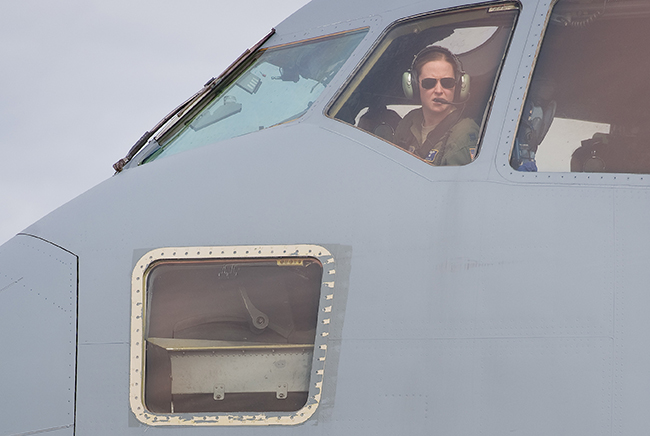
Capt. Erin Killion, 3rd Airlift Squadron pilot, looks out the pilot’s side window of a C-17 Globemaster III prior to engine start up March 25, 2015, at Dover AFB, Del. Killion, who was 15 weeks pregnant at the time, was on a local training mission consisting of air refueling and short runway assault landings. Air Force photo by Roland Balik.
Certain female airmen no longer need medical waivers to carry out flight duties while pregnant, according to a Sept. 23 Air Force release. Instead, they can consult with their health care providers and decide on their own whether to fly.
The new policy is effective immediately and affects remotely piloted aircrew, missile operations duty crews, and "certain fully qualified pilots," the release stated.
USAF will never force pregnant airmen to fly, and they can always change their mind and keep both feet on the ground, Air Force Surgeon General Lt. Gen. Dorothy Hogg said in the release.
“We recognize that each pregnancy is as unique as our professional female aviators we trust to operate our weapon systems,” Hogg said. “We’re empowering women to work closely with their obstetrician and flight medicine providers to pick a path that is tailored to their individual needs, while ensuring we’re doing everything to support them throughout their pregnancy.”
The service is also investigating whether it can safely give pregnant airmen more chances to carry out flight duties across all Air Force platforms, according to Lt. Gen. Jacqueline Van Ovost, the service’s staff director.
"Changes were made to the existing process for airmen who are fully qualified to fly, which expanded the time parameters for flying while pregnant, eliminated the requirement for a higher headquarters waiver (for airmen with uncomplicated pregnancies to be able to return to flight), and delegated authorities regarding the issue down to the local level," the release stated.
The shifts help service members stay current on their training and certifications as well. They are among the latest policy edits implemented over the last several years to make the force more accommodating to women, including changing pilot measurement requirements, broadening parental leave time, and opening certain special-operations fields.
In a recent interview with Air Force Magazine, Maj. Gen. Jeannie Leavitt, commander of the Air Force Recruiting Service, said the prospect of balancing motherhood with a career as a pilot “can be daunting” to female airmen if they haven’t gotten the chance to hear from others who’ve been in the same position.
Leavitt, a mother of two children born while both she and her husband were serving on Active Duty, was the service’s first female fighter pilot.
“A lot of it is seeing others like you and seeing how they did it, because a lot of the questions center around having a family and having a career, and finding that work-life balance or work-life flexibility—how you manage both—because you want to be successful in both,” she said.
The Air Force doesn’t want women—whether they’re already in uniform or considering a future in the service—to think they have to choose between serving their country and starting a family, Van Ovost said.
“We’re focused on eliminating barriers in our existing policies that signal to female airmen and potential recruits that becoming a parent and being an aviator, controller or missile operator in our service are incompatible,” Van Ovost said.
